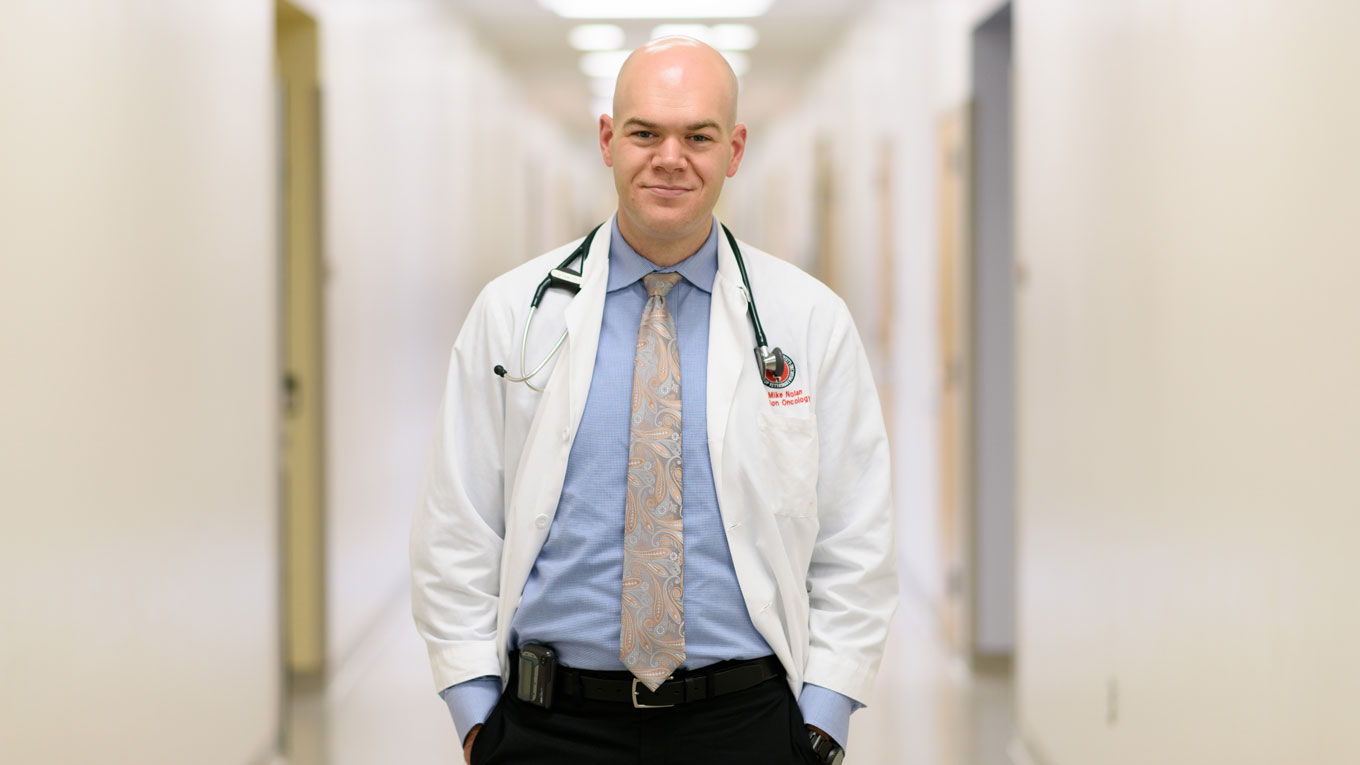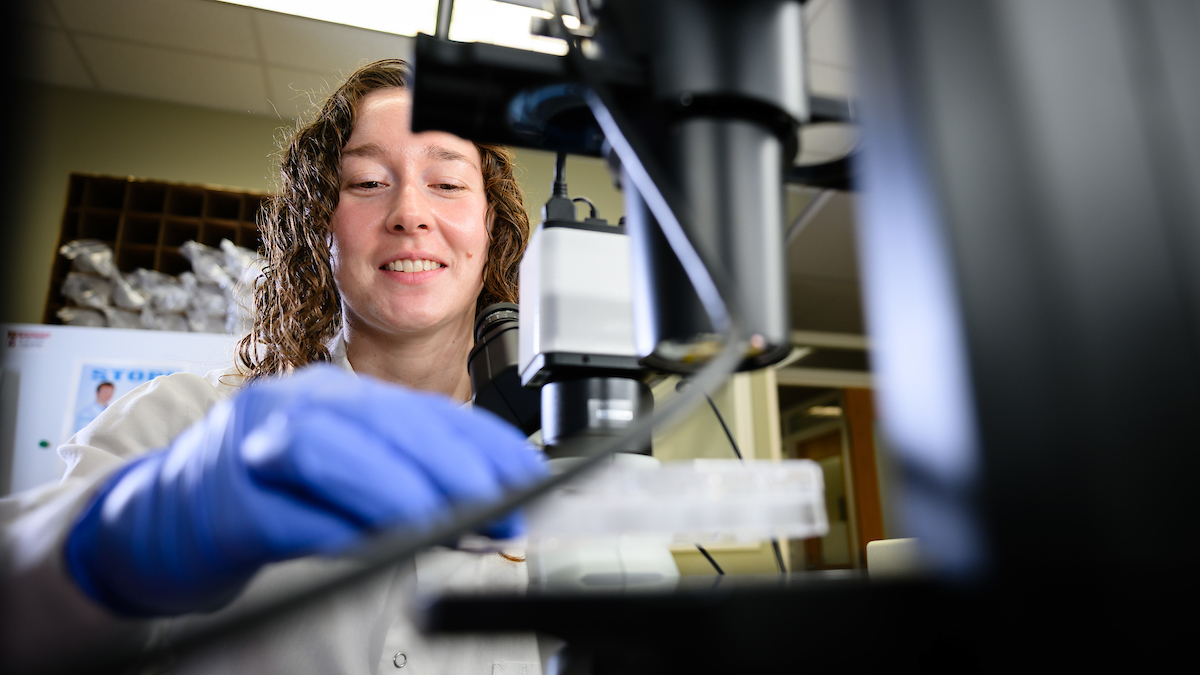NC State Clinical Trial Testing Promising Canine Osteosarcoma Treatment

Canine osteosarcoma is a particularly pernicious cancer. Not only do tumors destroy bone and unleash crippling pain, but cancer cells then typically leave the bone, spread to the bloodstream and create more tumors in the lung.
Even with surgery and aggressive chemotherapy, the average survival time is 10 months. About 15% to 20% of dogs make it to the two-year mark.
Now, a recently launched clinical trial at the NC State College of Veterinary Medicine is exploring a new approach.
Led by Mike Nolan, associate professor of radiation oncology, the trial is testing a new drug, XRD-0610, which has shown promise in enhancing the power of radiation therapy to treat a range of cancers in both companion animals and humans. An estimated 8,000 dogs in the United States are diagnosed with osteosarcoma each year.
Nolan is collaborating with a team from the company XRAD Therapeutics who developed the drug. XRAD Therapeutics. The first animal patient enrolled in the trial, named XRADIOS, in November, and more participants are needed for the first phase of the trial, which runs through June.
“By the end of this initial canine clinical trial, we’ll have made a ton of headway in determining whether this drug has a future in improving cancer care for children and dogs with osteosarcoma,” says Nolan. The canine version of osteosarcoma behaves similarly to the human pediatric form of the disease.
Radiation therapy could be used as an alternative to surgery for osteosarcoma, still reducing pain and slowing bone tumor growth, but avoiding major surgery and possible limb amputation.
The trial will determine whether XRD-0610 can amplify the effectiveness of radiation therapy and limit destructive side effects, increasing the chance of long-term survival.
Radiation therapy directs energy into cancer cells, breaking up DNA to stop cells from dividing and spreading. Cells have built-in tools to repair broken DNA, but XRD-0610 blocks activation of key repair pathways, says Nolan, so fewer of the cells evade radiation therapy.
“What is really neat about XRD-0610, and what makes it unique, is that it blocks not one, but actually two different parts of the DNA repair pathway,” says Nolan. “That makes for a powerful approach.”
Nolan’s work at NC State is devoted to developing new cancer treatment strategies as part of the large comparative oncology program at the CVM. NC State cancer care is divided into three clinical services — medical oncology, radiation oncology and surgical oncology — which represents one of the world’s largest veterinary oncology groups.
[give url=”https://securelb.imodules.com/s/1209/give19/form.aspx?sid=1209&gid=214&pgid=7348&cid=11690&bledit=1&sort=1&dids=10549&appealcode=LB002540″ headline=”Support Cancer Research” subheadline=”Give to the CVM’s Radiation Oncology Research Fund”]
CVM clinician-scientists not only conduct their own groundbreaking cancer research, but regularly collaborate with researchers within the NC State campus and the surrounding community, including scientists at the Duke Cancer Institute and UNC Lineberger, the cancer research and treatment center at the University of North Carolina at Chapel Hill.
Nolan connected with the XRAD Therapeutics team through the Consortium for Canine Comparative Oncology (C3O), a partnership between the CVM and the DCI that launched in 2016. Last year, Nolan began discussions about evaluating the newly developed drugs in dogs with cancer.
In addition to the XRADIOS trial, Nolan and the research team are overseeing three other clinical trials also investigating novel treatments for osteosarcoma. If a patient is not eligible for the XRADIOS trial, says Nolan, there is a good chance the team can find a study that’s a good fit, which may help improve the odds of successfully managing a given case of canine osteosarcoma. For information on all four clinical trials, go here.
In just the past few years, Nolan and CVM oncology team colleagues have also been a part of research involving new technologies to treat aggressive feline oral cancer and canine lymphoma.
“I am really fortunate to work with some of the most creative minds on the planet; they challenge me and constantly keep me thinking,” says Nolan. “And it’s not just my creative colleagues, but also the entire community we’re surrounded by.
“It’s the students and staff, the philanthropic donors who provide generous funding that directly supports the progress we’re making, and the many families and patients who provide endless inspiration. Together, that’s what keeps me motivated and optimistic.”
~Jordan Bartel/NC State Veterinary Medicine
For more ways to support cancer research at the NC College of Veterinary Medicine, go to https://hospital.cvm.ncsu.edu/services/small-animals/cancer-oncology/.


